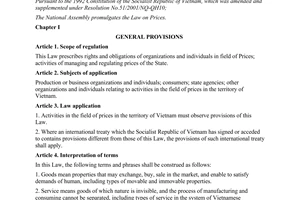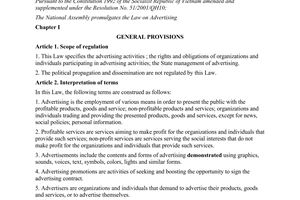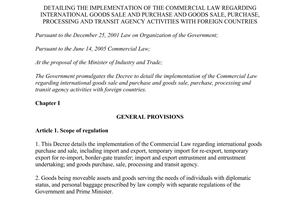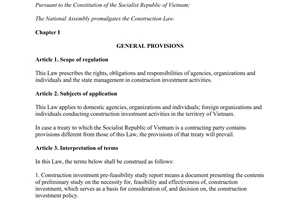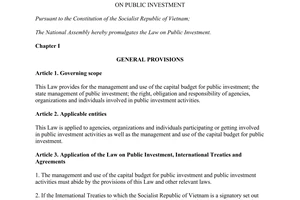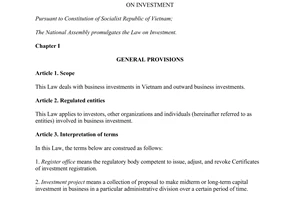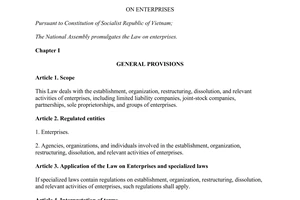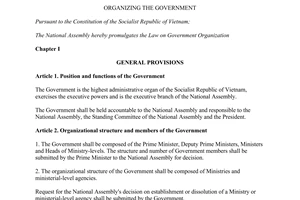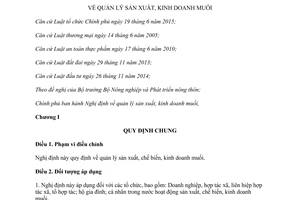Nội dung toàn văn Decree 40/2017/ND-CP on management of salt production trading
|
THE
GOVERNMENT |
THE
SOCIALIST REPUBLIC OF VIETNAM |
|
No. 40/2017/ND-CP |
Hanoi, April 5, 2017 |
DECREE
ON MANAGEMENT OF SALT PRODUCTION AND TRADING
Pursuant to the June 19, 2015 Law on Organization of the Government;
Pursuant to the June 14, 2005 Commercial Law
Pursuant to the June 17, 2010 Law on Food Safety;
Pursuant to the November 29, 2013 Land Law;
Pursuant to the November 26, 2014 Law on Investment;
At the proposal of the Minister of Agriculture and Rural Development;
The Government promulgates the Decree on management of salt production and trading
Chapter I
GENERAL PROVISIONS
Article 1. Scope of regulation
This Decree prescribes the management of salt production, processing and trading.
Article 2. Subjects of application
1. This Decree applies to domestic organizations, including enterprises, cooperatives, cooperative unions and cooperative groups; households; and individuals engaged in salt production, processing and trading activities.
2. Foreign organizations and individuals directly investing in salt production, processing and trading activities in the Vietnamese territory shall be regulated by this Decree and relevant laws.
3. In case a treaty to which Vietnam is a contracting party contains provisions different from those of this Decree, such treaty shall prevail.
Article 3. Interpretation of terms
In this Decree, the terms below are construed as follows:
1. Salt means a compound with the main component being sodium chloride (chemical formula: NaCl) which is produced from seawater or saline groundwater or exploited from salt mines.
2. Crude salt means salt which is produced from seawater or saline groundwater or exploited from salt mines, has not yet been processed, and contains substances with contents complying with Vietnam standard TCVN 9638:2013.
3. Refined salt means salt which has been processed and contains substances with contents complying with Vietnam standard TCVN 9636:2013.
4. Industrial salt means salt which contains substances with contents complying with Vietnam standard TCVN 9640:2013./
5. Food-grade salt means salt which is fortified with iodine for direct use or use in food processing and contains substances with contents complying with Vietnam technical regulation QCVN 9-1:2011/BYT.
6. Salt production means the process of making salt from seawater or saline groundwater or exploiting salt from salt mines.
7. Manual salt production means the process of producing salt in salterns, involving many production units each conducting the whole process from seawater evaporation to salt crystallization; production activities are carried out on a household-based scale primarily by manual labor.
8. Industrial-scale salt production means the process of producing salt on a large and centralized scale designed based on the technological process of fractional crystallization with seawater evaporation ponds, gypsum crystallizing ponds and salt crystallizing ponds which are separated from one another in order to facilitate mechanization of salt production, harvest and preservation.
9. Salt processing means the process of using equipment and applying techniques to process crude salt into salt of higher quality and salt fortified with iodine which is necessary for human growth and development.
10. Salt trading covers salt purchase, sale, processing, import, export, reserve, circulation, transportation and preservation.
11. Salt-making land means land areas under salt production development master plans approved by competent authorities, including land for industrial-scale salt production and land for manual salt production.
Article 4. State management of salt
1. Salt is an essential commodity the production, processing and trading of which are uniformly managed by the State nationwide.
2. Contents of state management of salt:
a/ Formulating, and organizing the implementation of, master plans and policies on salt production, processing and trading development;
b/ Promulgating, disseminating, and organizing the implementation of, legal documents on salt production, processing and trading;
c/ Formulating, and organizing the implementation of, standards and national technical regulations on salt products;
d/ Regulating salt supply and demand, salt import and export, salt quality management, national salt reserves, valorization of edible salt prices and other measures as prescribed by law;
dd/ Inspecting and examining the implementation of the law on salt production, processing and trading, handling violations in salt production, processing and trading in accordance with law.
Chapter II
MANAGEMENT OF SALT-MAKING LAND PLANNING AND SALT PRODUCTION AND TRADING
Section 1. MANAGEMENT OF SALT-MAKING LAND PLANNING
Article 5. Salt-making land planning
1. Contents of planning
Salt-making land planning must comply with the Land Law and shall be specified in the national land use master plan. The contents of salt-making land planning in salt-making localities must cover:
a/ Salt-making land use master plans and plans, which are part of the national land use master plan and plan and land use master plans and plans of salt-making localities;
b/ Salt-making land planning orientations, which shall be set for every 10-year period with a vision for the subsequent 10 years. Salt production development master plans shall be considered and adjusted once every 5 years, with supplements made for the subsequent 5 years; salt-making land use plans shall be formulated for every 5 years;
c/ Salt-making land quota within the agricultural land category; the salt-making land areas of each provincial-level administrative unit and each socio-economic region in the planning period, clearly identifying land areas to be permanently used for salt making and areas where salt production is manual and ineffective and needs to be replaced with other trades;
d/ Salt-making land planning maps, which shall be made for each provincial-level administrative unit and each socio-economic region;
dd/ Solutions for implementation of land use master plans and plans.
2. Order of formulating master plans
a/ The Ministry of Agriculture and Rural Development shall coordinate with the Ministry of Natural Resources and Environment, related ministries and sectors, and People’s Committees of salt-making provinces and centrally run cities in formulating salt-making land use master plans and plans to be specified in the national land use master plan;
b/ The order and procedures for formulating, appraising, approving, adjusting and promulgating salt-making land use master plans and plans must comply with the law on formulation, appraisal, approval, adjustment and promulgation of national land use master plans and plans.
3. The competence to decide on and approve master plans and adjustments to master plans must comply with the land law.
4. Salt-making land use master plans shall be used as a basis for implementation of policies to encourage salt production development prescribed in Chapter III of this Decree.
Article 6. Management of salt-making land master plans and salt-making land areas
1. Salt-making land use master plans and plans shall be promulgated and publicized in accordance with the land law and other relevant laws.
2. The State shall allocate or lease salt-making land under planning to domestic and foreign organizations, households and individuals in accordance with the land law.
3. The implementation of salt-making land master plans and plans shall be inspected and supervised to ensure proper and efficient use of salt-making land; the adjustment of salt-making land master plans and plans and the competence to decide on and approve adjustments to land use master plans and plans must comply with the land law.
4. Conditions for change of the use purpose of salt-making land:
a/ The change of the salt-making land use purpose conforms with approved land use master plans and plans;
b/ The project that changes the salt-making land use purpose is considered and approved by a competent state agency regarding such change.
5. People’s Committees of all levels may consider approving projects that use salt- making land more efficiently for another purpose in accordance with the land law.
6. Based on approved land use master plans and plans and the national master plan on salt-making land, People’s Committees of all levels shall decide not to permit the use of salt-making land for other purposes; and encourage investment to expand land areas for industrial-scale salt production and improve land to change manual salt production into industrial-scale salt production under planning.
Article 7. Responsibilities of users of salt-making land under planning
1. To use salt-making land properly under salt-making land use master plans and plans approved by competent agencies.
2. To organize salt production under planning and apply technical advances to raise salt production efficiency and protect the ecological environment.
3. To neither abandon nor pollute land.
4. Not to use untreated polluted water sources for salt production or processing; not to discharge waste and wastewater in a manner that causes environmental pollution and to take measures to prevent soil and groundwater salinization in surrounding areas.
5. To exercise their rights and perform their obligations during the use of salt-making land in accordance with the land law and other relevant laws.
6. The State shall encourage and support investment in the improvement of land under manual salt production into land for industrial-scale salt production under planning.
Section 2. MANAGEMENT OF SALT PRODUCTION AND TRADING
Article 8. Management of salt production, processing and trading
Responsibilities of salt production, processing and trading establishments:
1. To organize salt production, processing and trading in accordance with the Law on Enterprises and other relevant laws.
2. To make sure their equipment and technical infrastructure facilities serving salt production, processing and trading meet the following requirements:
a/ Causing neither contamination to products nor salinization in surrounding areas, and ensuring water drainage;
b/ Ensuring safety distance from polluted areas announced by competent state agencies in accordance with law and from centralized residential, industrial and medical waste treatment facilities;
c/ Using water that complies with national technical regulations on quality of residential water for washing, preliminarily processing and processing salt;
d/ Having a certificate of satisfaction of food safety conditions for salt production, processing and trading in accordance with law.
3. To carry out standard- or regulation-conformity announcement for food-grade salt, refined salt and industrial salt products according to regulations.
4. To ensure the quality of salt products sold on the market be up to standard- or regulation-conformity announcements registered with competent state agencies; salt products must have packagings and labels in accordance with the law on goods labels and food safety (except for industrial salt).
5. To comply with the law on fortification of food with micronutrients and the Ministry of Health’s regulations and instructions in the addition of iodine, spices, additives or pharmaceutical substances to salt products for direct human consumption or for food processing.
6. To comply with the Law on Advertising and guiding documents in advertising salt products and iodine-fortified salt.
7. To comply with the law on occupational safety and health with regard to their production facilities and employees in the process of salt production, processing and sale.
Article 9. Management of salt import and export
1. Organizations and individuals shall import and export salt in accordance with implementing and guiding regulations of the Commercial Law regarding international goods purchase and sale, goods purchase and sale agency, processing and transit with foreign parties.
2. The quality of imported salt must meet Vietnam standards and national technical regulations.
3. Salt importers shall inspect and assess salt quality, conduct standard- and regulation- conformity announcement and take responsibility before law for salt quality before sale on the market.
4. The State shall encourage the export of salt that meets importing countries’ requirements on salt quality and quantity.
Article 10. Supply-demand balance and regulation of the salt market
1. The Ministry of Agriculture and Rural Development shall assume the prime responsibility for, and coordinate with the Ministry of Industry and Trade and related local authorities and organizations in, balancing salt supply and demand, forecasting demand and setting orientations for annual and five-year planning of salt production and sale nationwide.
2. Measures for regulating the salt market upon occurrence of fluctuations:
a/ When it is necessary to temporarily reserve edible salt, the Ministry of Agriculture and Rural Development shall assume the prime responsibility for, and coordinate with the Ministry of Finance, the Ministry of Industry and Trade and the State Bank of Vietnam in, proposing the Prime Minister to consider and decide on the purchase of salt from salt makers for temporary reserve;
b/ The regulation of salt supply and demand and salt import and export must comply with the Government’s Decree No. 187/2013/ND-CP of November 20, 2013, detailing the Commercial Law regarding international goods purchase and sale and goods purchase and sale agency, processing and transit with foreign parties;
c/ The regulation of national reserve salt input, output and preservation must comply with the law on national reserves.
Chapter III
POLICIES TO ENCOURAGE SALT PRODUCTION AND TRADING DEVELOPMENT
Article 11. Investment in infrastructure
1. Principles: Investment projects to build infrastructure for salt production must conform with master plans on socio-economic development; master plans on salt-making land; and the availability of medium-term and annual public investment funds in each period.
2. The order and procedures for formulating, appraising, making investment policy decision and investment decision for, projects to build salt production infrastructure must comply with the Law on Public Investment, the Construction Law and other current regulations.
3. Investment contents:
a/ For manual salt production carried out by households, individuals, cooperatives and cooperation groups: The state budget shall support investment in building infrastructure in salt production areas, including embankments; pump stations; seawater supply canals; seawater ponds and tanks serving salt production; flood drainage systems; transport works, low-voltage electricity and residential water supply systems serving residents in salt production areas under planning;
b/ For industrial-scale salt production by enterprises, cooperatives and households: The state budget shall support compensation and ground clearance work, building of resettlement zones, investment in construction of outside-the-fence infrastructure works directly serving production and business activities of projects, including embankments, seawater supply canals, water drainage systems and transport works approved by competent authorities;
c/ Funding sources and mechanisms for support provision must comply with current regulations.
4. Assignment of investment support provision:
a/ The central budget shall provide support for investment projects to restructure the salt industry under medium-term and annual public investment plans registered with the Government in each period;
b/ Local budgets shall provide support for investment projects to restructure the salt industry under medium-term and annual public investment plans registered with provincial- level People’s Councils in each period.
5. The State shall encourage the raising of funds from other lawful sources to build infrastructure for salt production and trading.
Article 12. Investment credit to support salt production and trading
1. Investors in salt production and trading, services auxiliary to salt production, or salt storage warehouses are entitled to trade credit, investment credit and credit for policy beneficiaries in accordance with law.
2. Projects which are on the list of those entitled to loan provision and eligible for state investment credit may be considered for borrowing loans from the Vietnam Development Bank according to regulations.
3. Salt production and trading individuals and households are entitled to borrow preferential loans from the Vietnam Bank for Social Policies in accordance with current regulations of the State.
Article 13. Incentives for application of scientific and technological advances
1. The state budget shall support households, individuals, cooperatives and cooperative unions to develop models of association in applying scientific and technological advances and adapting to climate change in salt production as follows:
a/ Those who develop demonstration models of association in applying scientific and technological advances and adapting to climate change in salt production are entitled to support to cover expenses for purchase of instruments, engineering machines, equipment and essential supplies;
b/ To provide support to cover all expenses for training and retraining under the models and expenses for public information work for agricultural extension purpose in accordance with current regulations of the State;
c/ Funding sources, levels and mechanisms of support provision must comply with agricultural extension plans, programs and projects and guiding documents.
2. Investors in salt storage warehouses, salt production machinery and equipment or salt processing and equipment lines are entitled to support for:
a/ 100% of loan interest in the first two years and 50% of loan interest in the third year on maximum loans equaling the value of investment in salt production equipment;
b/ The difference between the interest rate of state development investment credit and the interest rate of Vietnam-dong medium- and long-term commercial loans borrowed to implement investment projects on salt processing lines and equipment for maximum loans equaling 70% of the projects’ value for a term not exceeding 12 years;
c/ Funding sources and mechanisms of support provision must comply with the Government’s regulations on support policies to reduce loss in agriculture.
3. For scientific research and technological development:
a/ The state budget shall support 100% of funds for implementation of scientific researches; 50% of total funds for necessary investments serving the implementation of trial salt production or processing projects and 70% of total funds for necessary investments serving the implementation of trial salt production or processing projects in areas with difficult socio-economic conditions;
b/ To prioritize and consider providing support at the highest level from the National Fund for Science and Technology Development, the National Fund for Technology Renewal, and Science and Technology Development Funds of ministries, sectors, provinces and centrally run cities for implementation of scientific and technological tasks;
c/ To encourage the application of the public-private partnership model and use of clean technologies in conformity with international standards in salt production and trading according to value chains. Funding sources and mechanisms of support provision must comply with current regulations.
Article 14. Human resources training
1. Each salt farmer who is in the working age bracket is entitled to state budget support for under-3-month basic training in salt production techniques. Funding sources and mechanism for support provision must comply with current regulations on policies on support for basic degree training and under-3-month training.
2. Owners of investment projects in salt production and trading according to value chains are entitled to 70% of expenses for domestic training. Each laborer is entitled to training support once for 6 months at most. The maximum support level is VND 1 billion for each investor in salt production or processing or each to-be-trained laborer. Funding sources and mechanism for support provision must comply with regulations on policies to encourage enterprises to invest in agriculture and rural areas.
In case their investment projects do not use direct support from the state budget, such support shall be included in production costs of organizations, individuals or households when finalizing them with competent state agencies.
3. The State shall prioritize domestic and overseas training at university and higher degree in salt production management and techniques to meet requirements for salt production development on the basis of association between universities, training centers and enterprises.
Article 15. Tax incentives
Salt production, processing and trading establishments are entitled to tax incentives in accordance with current tax laws.
Chapter IV
ORGANIZATION OF IMPLEMENTATION
Article 16. The Ministry of Agriculture and Rural Development
1. To submit to the Prime Minister for promulgation documents on state management of salt.
2. To perform the state management of the salt industry under this Decree and approved master plans on salt-making land and salt production and trading; to direct the strengthening of the salt industry management system from the central to local level; to formulate, and direct the implementation of, master plans and policies on salt production and trading development.
3. To assume the prime responsibility for, and coordinate with related ministries and sectors and People Committees of salt-making provinces and centrally run cities in, directing the management of salt production and trading.
4. To develop, and guide the implementation of, standards and national technical regulations applicable to the salt industry.
5. To assume the prime responsibility for, and coordinate with related ministries and sectors and People’s Committees of salt-making provinces and centrally run cities in, conducting food quality and safety inspections in the process of salt production and processing; to conduct periodical and unscheduled inspections of the observance of the law on food safety with regard to salt products.
6. To assume the prime responsibility for, and coordinate with the Ministry of Industry and Trade and the Ministry of Finance in, regulating salt supply-demand balance and propose the Prime Minister to consider and decide on temporary reserves of salt in each period.
7. To coordinate with the Ministry of Finance in formulating plans on purchase, sale and storage of national reserve salt in accordance with the law on national reserves.
8. To assume the prime responsibility for, and coordinate with related ministries and sectors in, examining and inspecting the implementation of master plans and plans on salt production management; to inspect the quality of imported salt and food safety with regard to salt products.
Article 17. The Ministry of Planning and Investment
1. To assume the prime responsibility for, and coordinate with the Ministry of Finance, the Ministry of Agriculture and Rural Development and related units in, balancing and allocating state budget funds for investment in infrastructure facilities for salt production under medium- term and annual public investment plans according to current regulations and this Decree.
2. To assume the prime responsivity for, and coordinate with the Ministry of Finance and the Ministry of Agriculture and Rural Development in, guiding the formulation and implementation of plans on funding sources for salt production development; and investment projects to build salt production infrastructure.
3. Annually, to inspect the implementation of policies on investment in the salt industry in accordance with this Decree.
Article 18. The Ministry of Finance
1. To guide, balance and allocate non-business funds to support the management of salt production and trading under annual plans in accordance with current regulations and this Decree.
2. To coordinate with the Ministry of Agriculture and Rural Development in regulating supply-demand balance and propose the Prime Minister to consider and decide on salt reserves in conformity with realities in each period.
3. To direct the implementation of measures to valorize salt prices in accordance with the Law on Price.
Article 19. The Ministry of Industry and Trade
1. To review the planning of chemical enterprises using salt as raw material and by- products from salt production (gypsum, bittern) in light of salt production areas; to direct and formulate plans on consumption of locally produced salt to serve the chemical industry and other industries.
2. To coordinate with the Ministry of Agriculture and Rural Development in regulating salt circulation in each period, ensuring salt supply-demand balance and stabilization of the salt market.
3. To assume the prime responsibility for, and coordinate with the Ministry of Agriculture and Rural Development in, inspecting, controlling and fighting against speculation to manipulate the market, production and trading of fake goods, trade frauds and other illegal acts in salt production and trading.
4. To assume the prime responsibility for, and coordinate with the Ministry of Agriculture and Rural Development, in regulating annual salt import and export on the basis of balancing supply and demand.
Article 20. The Ministry of Natural Resources and Environment
1. To assume the prime responsibility for, and coordinate with the Ministry of Agriculture and Rural Development in, conducting inspection and examination of the implementation of regulations on environmental protection by salt production and trading establishments.
2. To assume the prime responsibility for, and coordinate with the Ministry of Agriculture and Rural Development in, balancing the demand for salt-making land when formulating national land use master plans and plans, ensuring sufficient land areas for salt production nationwide.
3. To coordinate with the Ministry of Agriculture and Rural Development in proposing and formulating plans on development of salt production in response to climate change.
Article 21. The Ministry of Science and Technology
1. To coordinate with the Ministry of Agriculture and Rural Development in placing orders for researching and testing advanced technologies and equipment in salt production and processing serving the restructuring of the salt industry toward increasing added value and sustainable development.
2. To coordinate with the Ministry of Agriculture and Rural Development in planning and investing in the building of state-owned establishments specialized in research, application and transfer of scientific and technological advances in salt production and processing.
Article 22. The Ministry of Health
1. To assume the prime responsibility for, and coordinate with the Ministry of Agriculture and Rural Development in, performing the state management of food-grade salt in accordance with the law on fortification of food with micronutrients.
2. To formulate or review, amend and supplement national technical regulations on food-grade salt (iodine-fortified salt) and national technical regulations on substances used to add iodine to food in conformity with realities in each period.
3. To guide the use of salt by persons who, for medical reasons, cannot use iodine- fortified food.
Article 23. Provincial-level People’s Committees
1. To perform the state management of salt production, processing and trading in their localities; to formulate and promulgate mechanisms and policies on, provide levels of, and annually allocate local budget funds for, provision of support for investment in salt production.
2. To implement local master plans on salt production and trading in conformity with the national master plan; to direct provincial-level Agriculture and Rural Development Departments to perform the state management of salt production, processing and sale in their localities.
3. To direct and organize the grant of land use right certificates to salt producers in accordance with the land law.
4. To conduct dissemination about and organize the implementation of master plans on salt production, processing and trading in their localities. To use funds of national target programs on hunger eradication and poverty reduction and building of a new countryside, credit capital and other lawful sources to invest in salt production, processing and trading.
5. To take responsibility for regulation of salt prices in their localities. To report to the Ministry of Agriculture and Rural Development and the Ministry of Finance for submission to the Prime Minister support measures to regulate market prices to stabilize production and lives of salt farmers.
6. To inspect the production, processing and trading of salt. To supervise and inspect the implementation of standards and national technical regulations on food quality, safety and hygiene, occupational safety and environmental protection by salt production, processing and trading establishments; to handle violations in accordance with law.
7. To make periodical or irregular reports on salt production, processing and trading in their localities at the request of the Prime Minister or related ministries and sectors.
Chapter V
EFFECT
Article 24. Implementation provisions
1. This Decree takes effect on May 20, 2017.
2. In case a legal document referred to in this Decree is amended, supplemented or replaced, the amending, supplementing or replacing document shall prevail.
Article 25. Implementation responsibility
Ministers, heads of ministerial-level agencies, heads of government-attached agencies, chairpersons of provincial-level People’s Committees and related organizations and individuals shall implement this Decree.-
|
|
ON BEHALF OF
THE GOVERNMENT |


